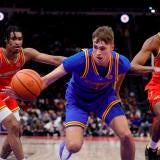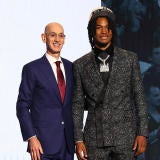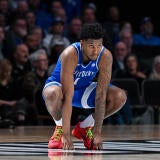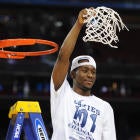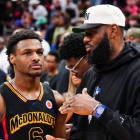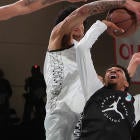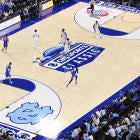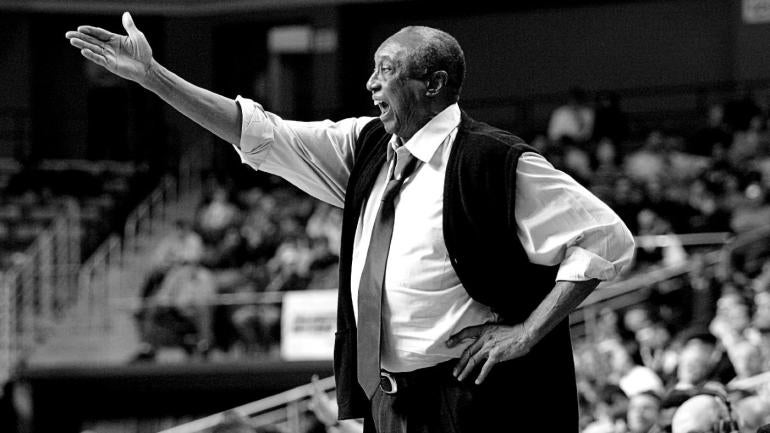
John Chaney, the legendary Temple coach who took the Owls to 17 NCAA Tournaments, five Elite Eights and won 741 games in a 34-year coaching career, including 24 seasons at Temple, died Friday at 89, the school announced.
The Temple program became nationally relevant for much of Chaney's tenure in the second half of the 1980s and throughout the '90s. The Owls grew to be known as arguably the best program — and Chaney the best coach — to never make a Final Four in the 64-team tournament era. From 1984-2001, Chaney guided Temple to the NCAAs every season except one.
Temple reached No. 1 in the rankings at the end of the 1987-88 regular season and was regarded as arguably the best team in college basketball as it entered that 1988 NCAA Tournament. Chaney was a defensive savant, a man who instituted a dynamic matchup zone defense that was mimicked, to varying degrees of success, throughout the sport. Chaney was a five-time Atlantic 10 Coach of the Year and won multiple coach-of-the-year awards on a national level in 1988. He also led TU to eight regular-season titles between 1985-2002.
The outspoken Chaney was a Black icon in basketball circles, and a man known for being fiercely loyal to his players. Philadelphia is maybe the greatest college basketball metropolis, and Chaney defined the ethos of what it meant to know, coach, teach and play basketball in that city. A proud graduate of Bethune-Cookman, Chaney's college head coaching career began in 1972 at Division II Cheyney State. He won 232 games, including the 1978 D-II national championship, before taking the Temple job in 1982. When he retired from coaching in 2006 Chaney was 741-312 after 34 seasons. His number of victories ranks 41st in NCAA history among all divisions.
Chaney was a fearless man; he suffered not one fool. He can fairly be defined as a unique figure in the history of basketball. He famously scheduled non-league games in a way that was as ambitious, if not more so, than any other coach. He would play anyone at almost any time. His philosophical approach to teaching his players and building out a challenging schedule is a template almost no coach today can honestly claim to subscribe to. Temple's teams under Chaney commanded the respect of opponents for their toughness, intelligence and relentless effort. What made Chaney such an icon in coaching was his dedication to the craft and his dismissal of recruiting rankings and reputations of players before they made it to college. He often brought in less-heralded young men and molded them into viable college basketball players.
Chaney also popularized the concept of early morning practices. He was famous for having his guys in the gym by the 5 a.m. hour, sweating off sleepy eyes and putting his players through the wringer. That mindset turned Temple into one of the more durable programs in college hoops for more than 15 years.
A Philadelphia legend who was proudly emotional, Chaney was someone who could flash an infectious smile just as easily as he could raise the hair on your neck with his steadfast conviction. To realize John Chaney is to realize there are no longer men of his vintage coaching in American sports anymore.
The most well-known video of Chaney is not during a game, or with the cutting of a net, or hugging his devoted players. Rather, it's the infamous dust-up and threat on then-UMass coach John Calipari's "ass." In 1994, Calipari was speaking to the media after his team defeated Chaney's Owls in a drag-it-out 56-55 affair. Calipari reportedly chastised the referees, despite the win. Chaney found out and didn't take kindly to it, so he proceeded to interrupt Calipari's press conference by vocalizing his displeasure with Calipari's alleged threats against the officials.
As Chaney made his way through his point, Calipari barked back, "Let me tell you something," and within seconds the men were on a collision course.
"I'll kill you!" Chaney shouted at Calipari as he charged toward the lectern, before being separated by people in the room. "You remember that. When I see you, I'm gonna kick your ass."
The altercation didn't cause a lifelong rift between the two, though. Calipari and Chaney mended ties and eventually became coaching allies. Calipari, now coach at Kentucky, paid tribute to his former rival after hearing of his death.
Coach Chaney and I fought every game we competed – as everyone knows, sometimes literally – but in the end he was my friend. Throughout my career, we would talk about basketball and life. I will miss those talks and I will my friend. Rest in peace, Coach! pic.twitter.com/0JGcQ7JPOO
— John Calipari (@UKCoachCalipari) January 29, 2021
Chaney's death, just a week after his 89th birthday, is the latest in what has been a depressing spate of loss regarding renowned men's college basketball coaches in the past eight months. He joins Georgetown's John Thompson Jr., Arizona's Lute Olson, Oklahoma State's Eddie Sutton, Illinois' Lou Henson and Oklahoma's Billy Tubbs in shuffling off the mortal coil. All Hall-of-Famers.
Whereas Thompson Jr. rose to a level of dominance, influence and fame at Georgetown that rightfully put him on the list of the most well-known coaches in American sports, Chaney's influence and impact was more confined within the world of college basketball. But no matter, he was a powerful figure all the same and as revered by his contemporaries as Thompson, Dean Smith, Bob Knight, Denny Crum and many other coaches that helped build the 1980s into college basketball's greatest decade.
John Chaney's Division I record
| Year | School | Record | Postseason |
|---|---|---|---|
| 1982–83 | Temple | 14–15 | |
| 1983–84 | Temple | 26–5 | NCAA Tournament second round |
| 1984–85 | Temple | 25–6 | NCAA Tournament second round |
| 1985–86 | Temple | 25–6 | NCAA Tournament second round |
| 1986–87 | Temple | 32–4 | NCAA Tournament second round |
| 1987–88 | Temple | 32–2 | NCAA Tournament Elite Eight |
| 1988–89 | Temple | 18–12 | NIT first round |
| 1989–90 | Temple | 20–11 | NCAA Tournament first round |
| 1990–91 | Temple | 24–10 | NCAA Tournament Elite Eight |
| 1991–92 | Temple | 17–13 | NCAA Tournament first round |
| 1992–93 | Temple | 20–13 | NCAA Tournament Elite Eight |
| 1993–94 | Temple | 23–8 | NCAA Tournament second round |
| 1994–95 | Temple | 19–11 | NCAA Tournament first round |
| 1995–96 | Temple | 20–13 | NCAA Tournament second round |
| 1996–97 | Temple | 20–11 | NCAA Tournament second round |
| 1997–98 | Temple | 21–9 | NCAA Tournament first round |
| 1998–99 | Temple | 24–11 | NCAA Tournament Elite Eight |
| 1999–00 | Temple | 27–6 | NCAA Tournament second round |
| 2000–01 | Temple | 24–13 | NCAA Tournament Elite Eight |
| 2001–02 | Temple | 19–15 | NIT third place |
| 2002–03 | Temple | 18–16 | NIT Quarterfinal |
| 2003–04 | Temple | 15–14 | NIT first round |
| 2004–05 | Temple | 16–14 | NIT first round |
| 2005–06 | Temple | 17–16 | NIT opening round |
| Division II total | | 225-59 | |
| Division I total | | 516-253 | |
| NCAA total | | 741-312 | |






